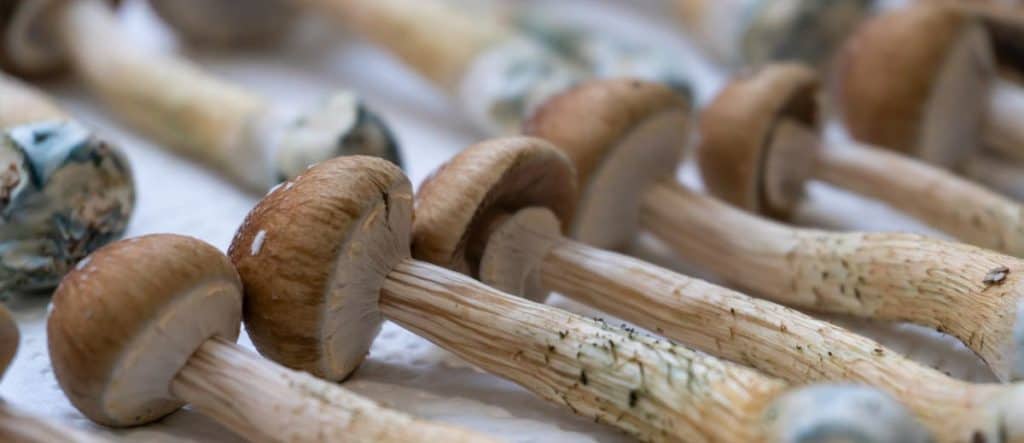Table of contents
With the passing of Measure 109 last week, Oregon officially became the first U.S. state to legalize psilocybin (the active ingredient in magic mushrooms) for therapeutic use in mental health treatment.1,2
However, the recent legalization of magic mushrooms for therapeutic use does not mean Oregonians can buy the drug at stores or take it home with them. Instead, psilocybin use will only be legally available through a regulated and state-licensed psilocybin clinic.
Measure 109 permits licensed service providers to administer psilocybin-producing mushroom and fungi products to individuals 21 years of age or older. The program created by Measure 109 is regulated and enforced by the Oregon Health Authority (OHA) and it allows licensed and supervised facilities to manufacture, deliver, and administer psilocybin.
The measure, which was backed by more than half a dozen democratic state lawmakers, and several veterans’ groups and statewide organizations, does not decriminalize psilocybin. It’s still federally classified as a Schedule I drug and is not approved for any medical uses.
Under Measure 109, the state of Oregon’s health is directed to take two years to establish a state-licensed psilocybin-assisted treatment program and rules for regulating the ingredient before people can start using it. The OHA will determine which patients are eligible for psilocybin treatment.
With psilocybin-assisted treatment, therapists will be able to use the ingredient to treat chronic mental health issues like PTSD and depression. Reports show many therapists also plan to use psilocybin to treat anxiety in patients who are dying and to help people overcome substance use disorders.
What Is Psilocybin?
Psilocybin is a naturally-occurring psychoactive substance found in more than 200 different species of mushrooms, often called, “magic mushrooms.” These mushrooms are primarily found in the Southwestern United States and Mexico. Historically, people have consumed magic mushrooms for spiritual rituals and medicinal purposes. Today, they are a federally controlled substance but are frequently abused due to the psychedelic effects they produce.
How Does Psilocybin Work?
Scientists believe the psychedelic, psilocybin, works by binding to 5-HT2A receptors. This produces feelings of well-being and relaxation and also provides positive long-term effects on mood.3
Magic mushrooms affect the brain’s prefrontal cortex. This part of the brain regulates abstract thinking, thought analysis, and also affects our mood and how we perceive things. The psilocybin found in magic mushrooms can also make you hallucinate. Many users report effects like seeing sounds or hearing colors.4
What Is Psilocybin-Assisted Treatment?
Psilocybin-assisted treatment is a type of treatment for mental health disorders like anxiety or depression in which psilocybin is administered in a therapeutic context and by a licensed treatment professional.
According to recent studies, when psilocybin is administered in a clinical setting, it can reduce symptoms of anxiety and depression.5 However, more research is needed to determine its ultimate safety and efficacy when used in treatment. Many medical and clinical professionals also question the appropriateness and risks of psilocybin’s use in treating substance use disorders.
So far, most studies have found that a single dose of psilocybin appears to have profound and lasting effects on mood. It is important to note that these findings are limited by relatively small sample sizes, though.
What Are the Risks of Psilocybin-Assisted Treatment?
Like any drug, using psilocybin, even under the supervision of a doctor, comes with risks.
- People with psychotic disorders, or strong risk factors for developing them, are advised against taking psilocybin.
- Since psilocybin is also known to raise blood pressure, people with uncontrolled hypertension are also advised not to use it.
- People with a history of substance abuse or who currently abuse multiple addictive substances should not take psilocybin for medical purposes or therapeutic treatment.
- Research on the addictive qualities of psilocybin and magic mushrooms is unclear, although they are most often not considered addictive. However, a person may still develop a psychological addiction to magic mushrooms or the effects they produce.
Although studies show clear potential for the psilocybin-assisted treatment of chronic mental health disorders, it may not the best option for people who are recovering from substance use disorders or who are currently abusing other addictive substances.
References:
- https://www.opb.org/article/2020/11/04/oregon-measure-109-psilocybin/
- https://ballotpedia.org/Oregon_Measure_109,_Psilocybin_Mushroom_Services_Program_Initiative_(2020)
- https://www.psychcongress.com/article/psilocybin-assisted-therapy-showing-promise-more-research-needed
- https://royalsocietypublishing.org/doi/pdf/10.1098/rsif.2014.0873
- https://www.ncbi.nlm.nih.gov/pmc/articles/PMC6007659/
